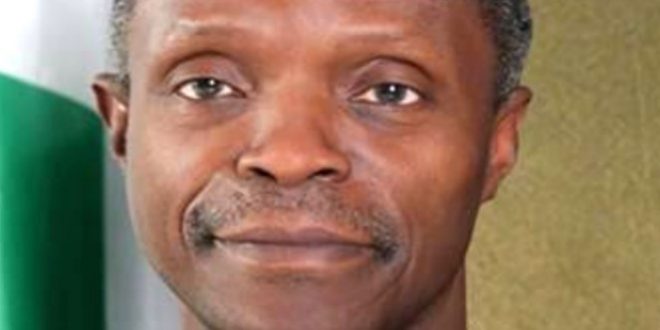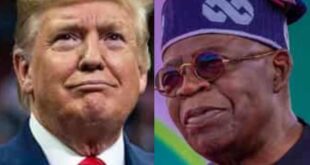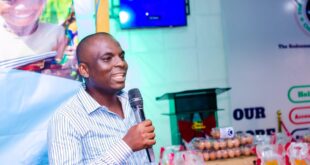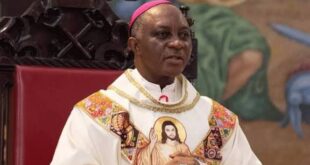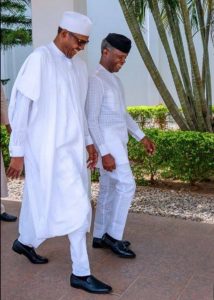
Professor Yemi Osinbajo, SAN, Nigeria’s Vice President, is arguably the country’s most loved number two citizen and most hardworking Vice President in the nation’s history.
Going by Nigeria’s chequered political history, many traditional politicians are generally viewed with distrust because they are sometimes seen as simply occupying public offices for occupying sake, rather than truly serving the people in their exalted position. This is why Prof. Osinbajo is different and a breath of fresh air in Nigeria’s politics. He embodies what the role of a public officer and politician should be: true service and dedication to the people.
This and more are reasons most Nigerians love their Vice President. But, that’s a story for another day. In this piece, I will be sharing some aspects of what makes Professor Osinbajo unique and why some of us love him so much even to a fault.
His commitment to excellence through hard work and dedication to duty set him miles apart from his peers and predecessors. To further buttress this position, I shall be taking a look at VP’s unique contributions to some major issues in Nigeria since his time as Attorney-General of Lagos State.
1. Institutional Reforms
When he served as Attorney General of Lagos State, Prof. Osinbajo is credited with undertaking far-reaching significant judicial reforms in Lagos State, addressing critical areas as judges’ recruitment, remuneration, training, and discipline. To address the problem of slow justice delivery at the Courts especially for poor people, he established appropriate institutions in the Office of the Public Defender (OPD) and the Citizens Mediation Centre (CMC) to give free legal advice and aid to the poor.
2. Contribution to Federalism
When Prof. Osinbajo was Attorney-General, he took the Obasanjo-led Federal Government to the Supreme Court over the withholding of funds belonging to the Lagos State Government in 2002. The argument was that the 1999 Constitution [in Section 8(4) empowered the State House of Assembly to create new Local Government Councils which Lagos State has fully complied with. Prof. Osinbajo argued that the President has no right to withhold the payment of funds due to the Local Government Councils from the Federation Account under Section 162 subsection (5) of the 1999 Constitution of the Federal Republic of Nigeria. Suffice to say the Osinbajo-led legal team won the case against the Federal Government, but Obasanjo still went ahead to withhold the State’s Local Government monthly allocations.
In the landmark case at the Supreme Court, the Judges were unanimous in their submissions that the Federal Government’s continuous withholding of the State’s Local Government allocation over its compliance with Section 8(4) of the 1999 Constitution was illegal and not in the spirit of true federalism. It is worthy to note that after this bold initiative led by Prof. Osinbajo, several other States like Osun, Oyo, and others began the process of creating more Local Government Areas to bring government closer to the people. After all, Local Governments are constitutionally created to be the third tier of government in the Federation by virtue of Section 7 and the Fourth Schedule of the 1999 Constitution.
3. Contribution to Party System and Democratic Development
After the formation of the All Progressives Congress (APC), Prof. Osinbajo was called upon, alongside other notable Nigerians in the party, to draft the manifesto for the new political party. This culminated in the presentation of the “Roadmap to a New Nigeria”, a document published by APC as its manifesto in 2013. The highlights of the Roadmap included a social safety initiative to specifically address poverty amongst other things. This included a free meal school plan and a conditional cash transfer to millions of the poorest and most vulnerable Nigerians. Significantly, this birthed the impactful Social Investment Programmes (SIPs) of the Buhari administration.
Osinbajo’s entrance into national politics also had a huge impact. In December 2014, the presidential candidate of the All Progressives Congress, (then) General Muhammadu Buhari (Rtd), announced Osinbajo as his running mate and vice-presidential candidate for the 2015 general elections. On the 31st of March 2015, the Independent National Electoral Commission (INEC) confirmed the Buhari/Osinbajo ticket having won the Presidential election. In February 2019, the Buhari/ Osinbajo ticket won the Presidential Elections for a second term in office. Both Osinbajo and Buhari became the first presidency in the nation’s history to defeat an incumbent administration in a free and fair election.
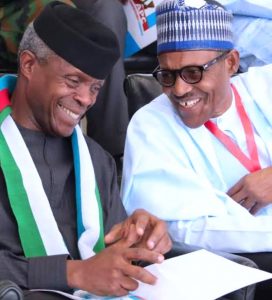 4. Education for All Projects
4. Education for All Projects
Outside political offices, Prof. Osinbajo has launched several initiatives to help the poor and downtrodden get access to education. To do this, he launched the Liberty Schools Project that provides free education for poor and needy children in poor communities in Obanikoro, Ikota and Makoko areas in Lagos State. The Project has been appraised by several international organisations as effective and efficient. Prof. Osinbajo spearheaded other initiatives that focused on free health care facilities, free legal services, social rehabilitation and skills acquisition for the poor.
5. Made In Nigeria Project
In 2018, due to his strong belief in locally made products and local contents, Osinbajo initiated the Project MINE (Made in Nigeria for Export), a Presidential Priority Intervention project aimed at increasing manufacturing sectors contribution to the economy and creating new jobs in the export-oriented manufacturing value chain. Also, in 2018, President Buhari Signed Executive Order (EO5) for the Development of Local Content in Science, Engineering, and Technology.
6. Actions Against Police Brutality and Commitment to Human Rights
Osinbajo has shown his commitment to upholding the rule of law and human rights for all Nigerians. In several ways, he has also shown he is against impunity and police brutality in the country.
As Acting President, Osinbajo terminated the appointment of Mallam Lawal Daura as Director-General of the Department of State Security over operatives unauthorized and unconstitutional invasion of the National Assembly in 2018.
Secondly, Osinbajo, as Acting President in 2018, ordered the overhaul of the Special Anti-Robbery Squad (SARS), a police unit, to make it more efficient and commit to respecting human rights for all Nigerians.
the National Economic Council (NEC), which is chaired by Osinbajo, has been at the heart of driving government’s actions on ensuring justice for all Nigerians and nipping crisis in the bud.
EndSars protest and NEC Judicial panels
The actions by the Osinbajo-led NEC is amidst calls for justice by individuals in other previous crisis, prompting the adoption of far-reaching decisions by government, including the setting up of judicial panels of inquiry by NEC in October 2020.
The Council had directed the immediate establishment of State-based Judicial Panels of Inquiry across the country to receive and investigate complaints of Police brutality or related extra-judicial killings so as to ensure justice for all victims of the dissolved SARS and other police units.
As of January, 2021, 28 States including the FCT had set up judicial panels.
7. Largest Social Investment Programmes in Africa
As Vice President, Prof. Osinbajo initiated the Buhari Administration’s Social Investment Programmes (SIPs), regarded as the largest social welfare scheme in Africa. The SIPs comprise of the N-Power Programme, currently employing 500,000 graduates; the GEEP loans (MarketMoni, FarmerMoni and TraderMoni), which provides credit to about 3 million Nigerian traders, artisans and businessmen; the Home-Grown School Feeding Programme which has fed about 10 million school pupils with free meals daily; and the Conditional Cash Transfer to the most vulnerable and poorest of Nigerians. The Office of the Vice President successfully coordinated the SIPs between 2016 and October 2019
8. COVID-19: Osinbajo’s Interventions and Economic Recovery
The Covid-19 pandemic greatly affected the economies of many countries, Nigeria inclusive. When Nigeria recorded its first COVID-19 death in March 2020, most Nigerians feared the worst. The Federal Government imposed a 4-week lockdown which meant peoples’ livelihoods were adversely affected. Many Nigerians asked urgent questions. How would the poor and vulnerable cope? What will be the fate of daily income earners? How will they cope? To help the nation cope with the pandemic, the Osinbajo-led Economic Sustainability Committee (ESC) recommended several post-COVID-19 recovery interventions.
As directed by President Muhammadu Buhari, Prof. Osinbajo-led committee drafted the Economic Sustainability Plan (ESP) where Nigerians are to benefit from several packages like MSME Survival Fund to support small businesses, Technology and Youth support, Mass Housing Programmes, Agriculture and food security scheme to provide jobs improve food supply and production nationwide, among others.
The ESP is a N2.3 trillion stimulus plan by the Federal Government as part of measures for post-COVID-19 economic recovery.
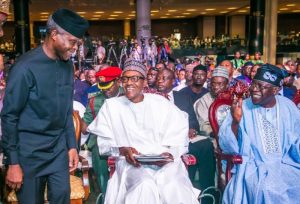 These also include the recently launched Solar Power Strategy which focused on supporting about 250,000 jobs and enabling the installation of 5 million Solar Home systems and mini-grids across the country, especially in underserved areas not on the national grid. The Plan, which the Central Bank of Nigeria (CBN) will provide structured loans to companies that will manufacture these Solar Home systems, of which many would be assembled locally in order to promote local manufacturing business. Also, the Mass Housing Programme is expected to create 1,500,000 jobs and build 300,000 affordable homes across the country in 12 months.
These also include the recently launched Solar Power Strategy which focused on supporting about 250,000 jobs and enabling the installation of 5 million Solar Home systems and mini-grids across the country, especially in underserved areas not on the national grid. The Plan, which the Central Bank of Nigeria (CBN) will provide structured loans to companies that will manufacture these Solar Home systems, of which many would be assembled locally in order to promote local manufacturing business. Also, the Mass Housing Programme is expected to create 1,500,000 jobs and build 300,000 affordable homes across the country in 12 months.
The ESP has been one of the major reasons for the country’s exit from recession in the 1st quarter of 2021.
9. Osinbajo and Niger-Delta Development and Peace
The erstwhile volatile Niger-Delta has achieved much peace since 2016. This is thanks to the Niger Delta New Vision, which is the blueprint of the Buhari administration to develop the Niger Delta. This initiative was spearheaded by the Vice President on behalf of President Muhammadu Buhari when the VP went on a tour of the region in 2017 and meetings with Niger Delta elders. Osinbajo’s leadership acumen has not only helped rebuild the trust of many who had been skeptical of the Federal Government’s plan for the region, but it has also contributed significantly to the peace and stability in the region. Osinbajo’s deft handling of the issues helped to improve the country’s oil revenue that was decimated by past restiveness in the region. The Niger Delta New Vision of the Buhari administration, driven by the Vice President, has not only helped a great deal in resolving insecurity and youth restiveness in the Niger-Delta region, but it has also had a huge positive impact on the economy as crude oil is Nigeria’s major foreign exchange earner.
10. Osinbajo and Ease of Doing Business
On May 18, 2016, As Acting President, Prof. Osinbajo signed the Presidential Executive Order on Ease of Doing Business. This Order was aimed at improving businesses in the country and attracting foreign direct investments (FDI) to Nigeria. This Order made it easy for Nigerians to register their businesses with the Corporate Affairs Commission (CAC). Since 2016, Nigeria has risen by an aggregate of 39 places on the World Banks Ease of Doing Business rankings.
11. Osinbajo’s involvement in TECH brought about the following:
Google Inc. in July 2020 announced plans to establish its first Google Launchpad Space outside the United States in Lagos.
Facebook, in September 2020 made public its decision to open an office in Lagos as part of its planned expansion in Sub-Saharan Africa.
HUAWEI in November 2020, promised the Vice President that the company will position Nigeria as a technology center for the African continent and give more jobs to young Nigerians.
12. MSMEs
Osinbajo has driven the growth and empowerment of MSMEs in the country through his involvement in MSME Clinics which have held in 26 States, twice in Ebonyi and then across the country including the FCT. 7 One-Stop-Shops for MSMES – Cross River, Kwara, FCT, Abia, Bauchi, Osun, Plateau.
***FG has also launched Shared Facilities for MSMEs in Oyo, Bauchi, Benue, and Lagos. This is to allow MSMEs without the financial capacity to own their equipment and the opportunity to go into a fully equipped cluster-style facility to pay a token to use such equipment.
***Over 400,000 MSMEs have so far participated in the MSME clinics nationwide. About 300,000 new business names have been registered by the Cooperate Affairs Commission (CAC) at a reduced 50% price of N5000, down from the normal N10,000.
13. National Livestock Transformation Plan
The NLTP is a creation of NEC, chaired by VP Osinbajo and State Governors and is completely distinct from the now-suspended RUGA: The RUGA initiative was suspended by President Muhammadu Buhari in July 2019.
Osinbajo had publicly rejected RUGA and instead articulated the NLTP which has six pillars through which it aims to transform the livestock production system in Nigeria, including through ranching along a market-oriented value chain while ensuring an atmosphere of peace and justice.
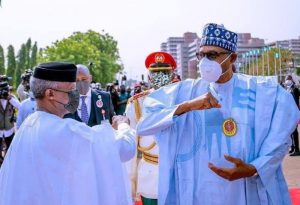 14. Energizing Economies and Energizing Education
14. Energizing Economies and Energizing Education
Osinbajo supervised the provision of solar power to markets around the country such as Ariaria in Aba, Sabon Gari in Kano, Sura in Lagos, etc., as part of the energizing economies initiative of the Rural Electrification Agency. VP Osinbajo also commissioned solar power plants in Universities such as Alex Ekwueme University, in Ebonyi, Bayero University in Kano, and most recently, the Abubakar Tafawa Balewa University Energizing Education Solar Power Plant on the 11th of February, 2021.
Signed:
Badmus Olawale (Liberty), Convener, Buhari/Osinbajo Solidarity Front (BOSF)
Courtesy: Directorate of Media & Publicity, BOSF.
March 7th, 2021
www.bosf.ng
 Startrend International Magazine For Your Latest News And Entertainment Gists
Startrend International Magazine For Your Latest News And Entertainment Gists


